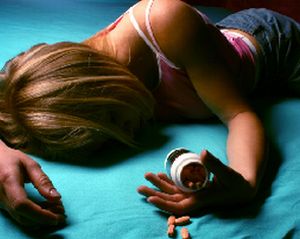Illicit Drug Use Adolescents and Troubled Teens
By Curtis Reed
Experimentation with illicit drugs during adolescent years is common today. Unfortunately, troubled teens often don't see the link between their actions today and the consequences tomorrow, such as drug use. Troubled teens have a tendency to feel indestructible and immune to the problems that others experience, especially when it comes to drug and alcohol abuse.
Drug abuse and addictions is associated with a variety of negative consequences for troubled teens, including increased risk of serious injury (physical and emotional), school failure, and poor personal choices which may put adolescents at risk for accidents, violence, unplanned pregnancy, unsafe sex, and suicide. 
Alcohol and other drug use among our nation’s adolescents remains a major public health problem. Substance abuse and addictions to illicit drugs can increase the risk for injuries, violence, HIV infection, and other sexually transmitted diseases. illicit drug addiction - adolescents & troubled teens
Adolescence is a time of important physical, intellectual, emotional, and social development. Adolescence is a time for young people to learn how to solve problems, build close friendships, make decisions, and handle responsibility are important during the teen years.
Drug use interferes with teens' ability to learn and improve those skills. Whether it's alcohol, cigarettes, marijuana, or other illicit (illegal) drugs, the bottom line holds true: teens who use drugs put their future in danger.
In 2008, almost one third of U.S. adolescents age 12–17 drank alcohol in the past year, around one fifth used an illicit drug, and almost one sixth smoked cigarettes. This means that on an average day, 508,000 adolescents drink alcohol, 641,000 use illicit drugs, and more than 1 million smoke cigarettes, according to a national survey sponsored by the Substance Abuse and Mental Health Services Administration (SAMHSA).
Parents tend to underestimate their teen's exposure to illegal drugs. Almost 1/3 of teens report that they have used illicit drugs at some point in their lives. Using alcohol and tobacco at a young age -- especially before high school-increases the risk for using other drugs later, such as marijuana and cocaine.
Young people who don't use drugs are more likely to stay in school than those who do use drugs. Parents can prevent their children from using drugs by talking to them about drugs, open communication, role modeling, responsible behavior, and recognizing if problems are developing.
Warning signs of teenage illicit drug abuse and addiction may include:
Physical: Fatigue, repeated health complaints, red and glazed eyes, and a lasting cough.
Emotional: personality change, sudden mood changes, irritability, irresponsible behavior, low self-esteem, poor judgment, depression, and a general lack of interest.
Family: starting arguments, breaking rules, or withdrawing from the family.
School: decreased interest, negative attitude, drop in grades, many absences, truancy, and discipline problems.
Social problems: new friends who are less interested in standard home and school activities, problems with the law, and changes to less conventional styles in dress and music.
Some of the warning signs listed above can also be signs of other problems. Parents may recognize signs of trouble and possible abuse of alcohol and other drugs with their teenager. If you have concerns you may want to consult a physician to rule out physical causes of the warning signs. This should often be followed or accompanied by a comprehensive evaluation by a child and adolescent psychiatrist or mental health professional.
